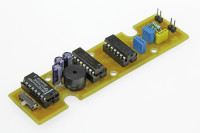Beep - a sounding logic probe/tester [140410]

I find it pretty annoying when I use a multimeter and look at the display only to find out that I accidently disconnected the probe from the pad.That's where the logic probe, we dubbed Beep, comes in. Instead of using a display, it uses a buzzer to represent the Signal Under Test (SUT) with sound.
I find it pretty annoying when I use a multimeter and look at the display only to find out that I accidently disconnected the probe from the pad.
That's where the logic probe, we dubbed Beep, comes in. Instead of using a display, it uses a buzzer to represent the Signal Under Test (SUT) with sound.
Beep has two connectors, one is used for its power supply taken from the circuit under test and the other connector is used for the SUT. When the second connector (for the SUT) isn't connected to anything or is connected to a circuit with too high impedance, the buzzer remains silent. If the connector is connected to something, the buzzer will begin to buzz.
When the SUT is logic 0, the buzzer will buzz with a low tone. If the SUT is logic 1, the buzzer will buzz at a high tone. If the SUT has a frequency, a frequency divider with a division factor of 256, 1024 or 2048 (actually a 12-stage binary ripple counter) will kick in in order to lower the frequency to a audible frequency. The division factor can be changed by use of the switch.
Beep’s components are mostly taken from the Elektor.Labs Preferred Parts (ELPP) library. Farnell and RS order codes can be found there.




Discussion (2 comments)
Ahad Iran 5 years ago
NECV20 10 years ago
When I test this circuit, I get a shortcut when I test a frequency of 100 kHz.
If I take the SOT-probe off the circuit after the shortcut occurs, pin 13, 14, 15 of IC1 stays high and the shortcut persists. The only way to resolve this, is to cut the powersupply from the circuit.
Even if I take IC1 off the PCB, and power it with 3.3V, testing on high or low level sometimes (about 1 in 10 times) results in a shortcut.
Is R7 not a 0 Ohm resistor?
NECV20 10 years ago
BAECK 10 years ago
NECV20 10 years ago
BAECK 10 years ago